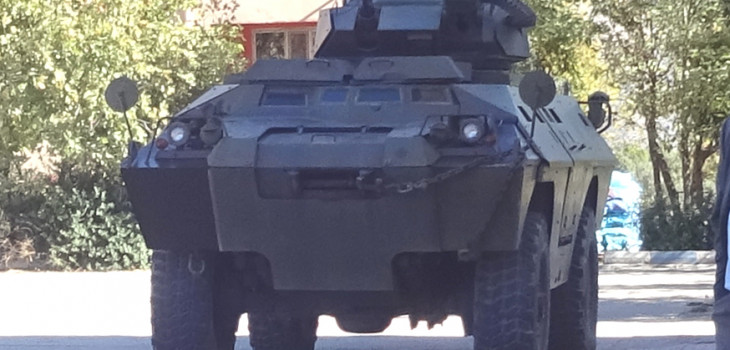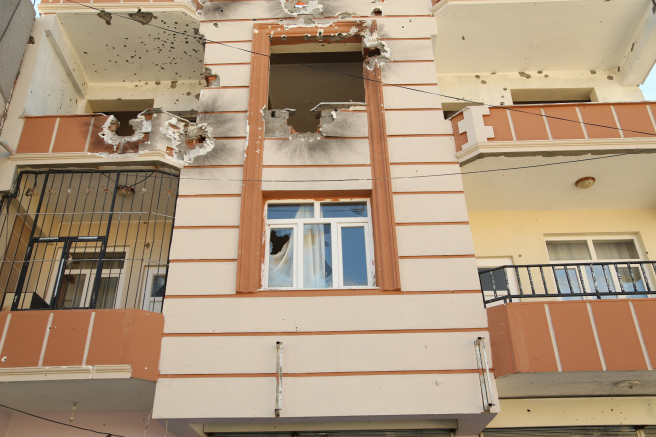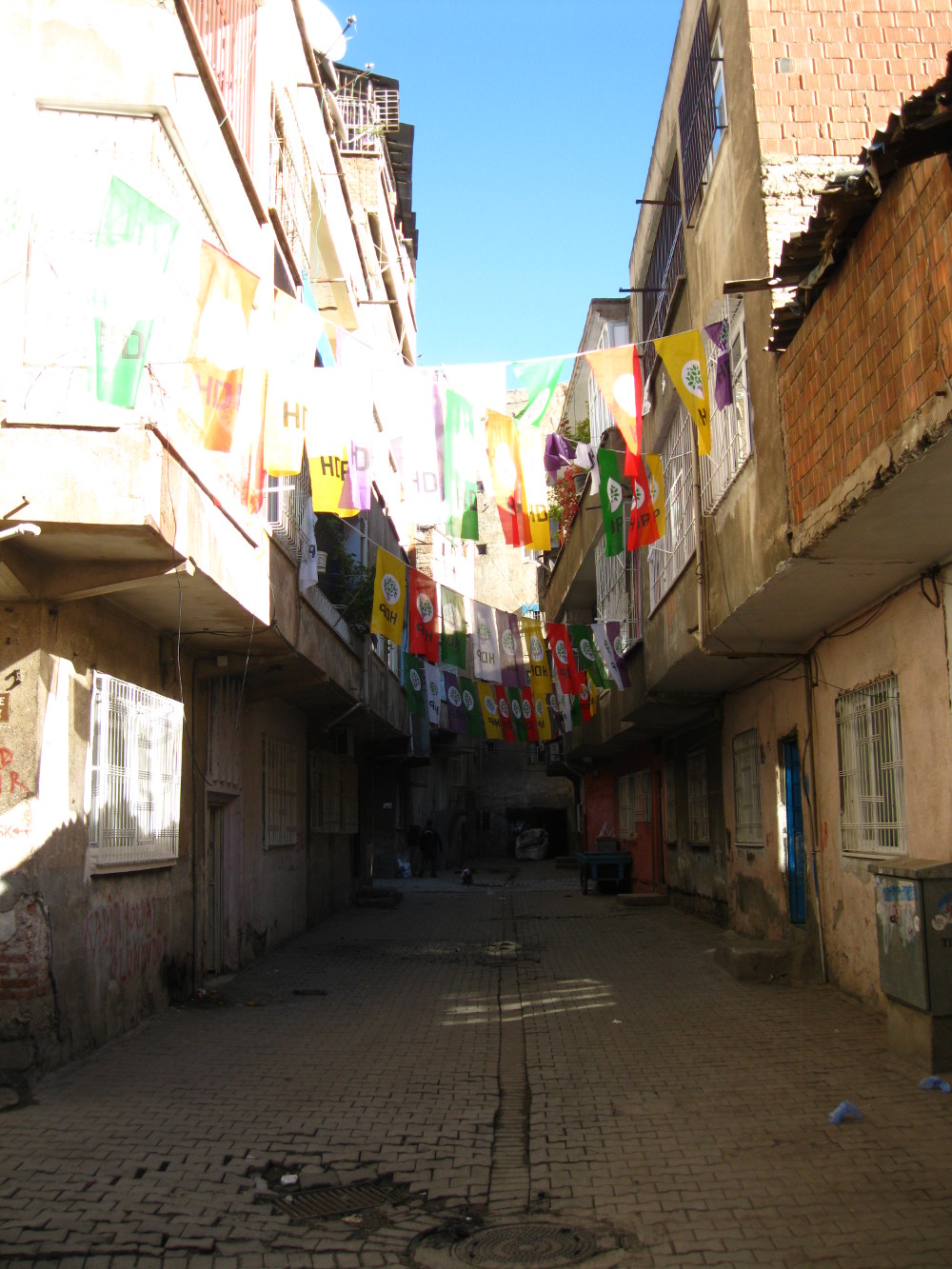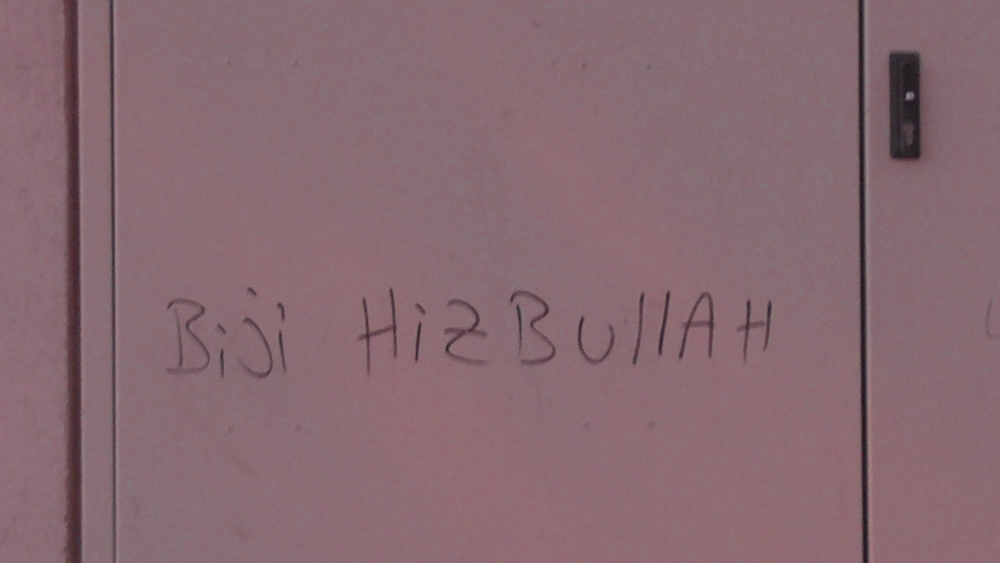The struggle for autonomy in North Kurdistan: Voices from Cizre

[responsivevoice_button]
People in cities across North Kurdistan (the part of Kurdistan within Turkey’s borders) are fighting for their autonomy from the Turkish state. Several cities made declarations of self-rule in Summer 2015 in response to attacks by the police and army. Barricades have been erected in city centres and people have taken up arms to prevent state forces from entering their neighbourhoods.
In October 2015, the Turkish police and army began an operation in the city of Farqîn (Silvan in Turkish), aimed at breaking the movement for autonomy. The attack led to the killing of 14 civilians and the destruction of hundreds of houses in the city (to read more about the struggle in Farqîn click here). A similar attack has been waged against people in the city of Nusaybin where the police have laid siege to the city and killed nine civilians.

Buildings damaged by the Turkish army’s attack on Silvan
Early in the morning on Wednesday 2nd December, police announced the latest in a series of curfews in the Sur district of Amed (Diyarbakır in Turkish). For over a month armed women and men have stood guard at the barricades in Sur. At least two people have been killed by police in Sur since Wednesday morning. Last week, Tahir Elçi, the head of the Diyarbakır Bar Association was gunned down on the street in the same district.

Diyarbakır’s Sur district

A Barricade on a city street in North Kurdistan
Cizîr (Cizre in Turkish) declared autonomy from the state during the summer. Since Summer 2015, the streets have once again been barricaded by ‘people’s defence forces’ and people have formed street communes and neighbourhood assemblies to organise themselves independently of the state. These assemblies try to build autonomy by, for example, setting up commissions to solve disputes without going to the police or courts, look after self-defence of the community and organise education in Kurdish.

Cizre
In response the Turkish police and army have imposed countless curfews on the city in recent months and attacked residential neighbourhoods with extreme violence to try to regain control. In September 2015, Cizîr was besieged by the Turkish army and 21 people were killed. A curfew was placed on the city for nine days. Since then, yet more curfews have been declared, at least three more people killed and many wounded. People have kept on resisting throughout November, while electricity has been shut off and emergency services have been prevented from reaching sick people.
However, the history of resistance in Cizîr did not begin there. The interviews below are about an earlier period of the rebellion in Cizîr, the period after the Kurdish uprising (serhildan) in 2014 against Turkish state support for the Daesh attack on Kobanê, a Kurdish city in the autonomous region of Rojava (within the borders of Syria). They provide some context to the events that are unfolding now on the streets of Cizîr.
Popular rebellion in Cizîr in 2014
In October 2014 people came out onto the streets in Cizîr, like in cities all over North Kurdistan, in support of Kobanê. People began to build barricades in their neighbourhoods. More barricades were built in December in response to new attacks by the police. The resistance developed into a popular rebellion.
This rebellion was a direct response to the state violence against Kurdish people, and particularly against the pro-Kurdish People’s Democratic Party (HDP), a party supporting democratic autonomy in the Kurdish region which was preparing to stand in the general election the following year against the ruling Justice and Development Party (AKP). The attacks against Kurdish movements were being carried out by the police, and also a shadowy group called Kurdish Hezbollah (KH). The aims of these attacks were to intimidate Kurdish people, to provoke them into violence and to prevent the HDP from building electoral support to rival the AKP.
Kurdish Hezbollah
Kurdish Hezbollah, whose name means ‘party of god’ are a Kurdish Sunni Islamist group that is carrying out increasing numbers of attacks on the HDP, PKK (the Kurdistan Worker’s Party, which previously advocated an independent Kurdish state and now supports democratic autonomy in Kurdistan) and the communities that support them. The group is unconnected to the Lebanese Hezbollah. In the 1990’s KH was in direct conflict with the PKK, killing hundreds of its members.

Graffiti supporting Kurdish-Hezbollah (KH) in Silvan. KH have been carrying out atacks, like the one which killed 15 year old Barış Dalmış
Many journalists have examined the historic links between KH and the Turkish state and a retired colonel in the Turkish army has admitted setting up the group to ‘fight the PKK’. In 2012, Hür Dava Partisi, or Hüda-Par, the Free Cause Party, was formed as a legal political party, and front group for Hezbollah.
In many of the cities Corporate Watch visited in July 2015, people told us about KH attacks and claimed that the group is armed by the Turkish state.
Below are two interviews with people from Cizîr, carried out in July 2015, about their experiences of the resistance and repression between September 2014 and January 2015 and their calls for solidarity.
Interview with Zubeyde Dalmış about the murder of her son

Pictures of people killed in Cizre by state forces, including Barış Dalmış, Ümit Kurt, Nihat Kazanhan and Yasin Özer – all children and teenagers killed in 2014-15
Corporate Watch interviewed the family of 15 year old Barış Dalmış, who was shot dead on 27 December 2014. Barış’ family tell us that Barış was killed by Kurdish Hezbollah (KH). He was one of several people killed by Hezbollah that day and just one of the five teenagers killed by Hezbollah and the Turkish police during this period.
Barış’ mother, Zubeyde, begins: “For 20 years our children have been killed and no one has helped us. All governments act to help Turkey and they call us terrorists. They have killed many Kurdish journalists also. My husband has been in prison for two years.”
A man sitting with us interjects: “we are no longer afraid of anything because we have seen everything. They have killed us, put us in prison, burnt our homes, our cities. We only want you to tell the truth. If you have some effect please use it.”
Can you tell us about Barış?
“Barış was 15 years old. He was a good child. He liked basketball and had been to school for eight years. He was interested in the problems of Kurdish people and sung Kurdish songs. I have seven children including Barış, now there are six. My biggest child is in the mountains as a guerilla.”
Can you tell us about the night Barış was killed?
“There are some people here who support ISIS. They are called Hezbollah. In Cizre, the government protects Hezbollah and gives them guns. At night these groups attack people. They killed Barış at night.
On the day Barış died, some dead bodies had been brought from Kobanê and there was a condolence tent in the street. It was late and there were not many people there. Then Hezbollah attacked the tent. They shot Barış and then they ran away.”
The man who is sitting with us tells us, “we knew that the government were trying to cause fighting between Kurdish people because of the election. Because of this the PKK didn’t do anything. The PKK could have killed them all, but they didn’t because of the elections and because the government would have accused the PKK of killing civilians.”
At the time the PKK was maintaining a ceasefire, the government had been attempting to provoke them into breaking it in the hope of delegitimising the pro-Kurdish HDP in the run up to the elections, which were due to take place in June 2015.
Zubeyde continues: “They [Hezbollah] shot him in the heart, so he only stayed alive for a few minutes. He was in front of a wall. Part of the bullet remained in the wall. Hezbollah live close to here. They walked on the streets with guns and they know that they are protected so they can kill. The police acted only to protect Hezbollah. After Barış was killed police used teargas and water cannons on the crowd of people who had gathered to help.
The police didn’t visit us after the shooting. They just drove around in their cars to show their power. They looked at people and then drove off. They didn’t speak to anyone. Five other kids from the same area were killed by Hezbollah and the government in the same period.
Hezbollah and the police are the same. When they attack, you don’t know where the bullet has come from. Sometimes Hezbollah drive around in police cars.”
Barış’ sister, who is sitting with us, tells us: “When Barış was shot, there were Kurdish doctors who wanted to help him, the police saw this but they prevented people from helping.”
Do you have any messages for people outside Kurdistan who read this story?
Zubeyde said: “I don’t want this to happen again to another mother. …tell people our story for peace and so other mothers don’t cry like me. We want peace so that our children can come down from the [guerilla bases in the] mountains and come home.”
Interview with a woman who wanted to remain anonymous about the events of December 2014
What happened in Cizîr during the attack on Kobanê in 2014?
“When the Kobanê situation was very hard the Turkish president said on every TV channel that Kobanê would fall, the Kurdish fighters will lose and ISIS would win. The people of Cizîr wanted to give a voice to Kobanê and to what the Turkish government was doing by helping Daesh. Demonstrations began in Cizîr and all over Turkey.
The demonstrations in Cizîr began on 9 October 2014, which is the anniversary of the beginning of the international plot to arrest Abdullah Öcalan [the imprisoned leader of the PKK] by the international capitalist governments and Turkey. Every year there is a protest on this date.
Last year we wanted to go out and protest as usual but the police attacked us with gas and water cannons – so the demonstrations began. As the demonstrations got bigger the army also began attacking us.
These demonstrations lasted for a week, and after that they stopped.
The resistance started again on 27 December after Hezbollah attacked the HDP. We know that the army wanted a provocation so they did this with Hezbollah.
The HDP’s election car was touring around the city and Hezbollah stopped it and attacked it. They were carrying guns. They attacked the driver and announcer with fists and kicks. When they attacked the car, our young people defended them and the demonstrations started again. If they had not helped them maybe Hezbollah would have killed them.
There was a place where young people meet every night. On the night of 27 December the police attacked this place at 3.30am. After this attack the young people began to organize social defence of the city against the police by closing the streets with barricades. Then all of the people of the city joined them against the police and Hezbollah.
On the morning of the 27 December at 5am the first young person was killed by a police bullet, although we can’t be sure if it was a police gun or Hezbollah. All we know is that he was killed by a professional sniper not an amateur. He was shot in the head. His name was Yasin Özer, he was 19.
On the night of 27 December they killed a second young person, Barış Dalmış – he was killed by Hezbollah.
There is no real Hezbollah organisation. If the army wants to say that another hand does all this killing then they use Hezbollah. Less than a hundred people are close to Hezbollah in Cizîr. They have no real power. It’s the Turkish police and army who do everything. They want people to think there are problems between the PKK and Hezbollah.
After the 28th the demonstrations continued. All of the people acted like an army of social defence. They set up teams to watch their houses, streets and homes. After two weeks the government said they would stop their attack on the people. The young people began to open the barricades. Then the police attacked and killed another person, a 14 year old child called Ümıt Kurt. He was killed with a police gun. Shot in the head. After that, the demonstrations started again as we knew we could not believe the police.
Every day our party [the HDP] did interviews on the TV saying ‘don’t be provoked’, people listened but the police continued their provocation.
After that Abdullah Öcalan sent a message to people in Cizîr to stop the demonstrations. Hatip Dicle, chief of the DTK [the Democratic Society Congress, an organisation which aims to establish democratic autonomy in North Kurdistan], came to Cizîr and read Öcalan’s statement. We were awaiting Öcalan’s message and it was a signal for us, it said to ‘Stop’ so people opened the barricades.
But even before Hatip Dicle arrived back in Amed another young person died. 12 year old Nihat Kazanhan was killed by a police gun – police used a shotgun and shot him in the head.”
What can people do in solidarity from outside Kurdistan?
“What the Turkish military and police are doing is not only against the Kurdish people, it’s against all the people in the world. We want people to give us a voice against this attack on our people.
In Rojava there are many people from the UK, Europe and other countries fighting for the YPJ and YPG [the armed forces of Rojava]. We think that people in the UK have a voice to tell the truth about what the Turkish government is doing.”
Do you think that people should try to stop the supply of arms to the Turkish police and army?
“An army is not for genocide, not for killing civilians, the army should only be used for defence. But the government has used the army for genocide against the Kurdish people. When companies sell weapons to the Turkish police and army they are complicit in this genocide so they need to stop. You can sell something to a government for defence, but if you know that this government uses its weapons for genocide or attacks on other countries or civilians then you are a part of the genocide.”
To read about the companies supplying arms to the Turkish police and military click here and here.
To read about the struggle for autonomy in the city of Silvan click here.
